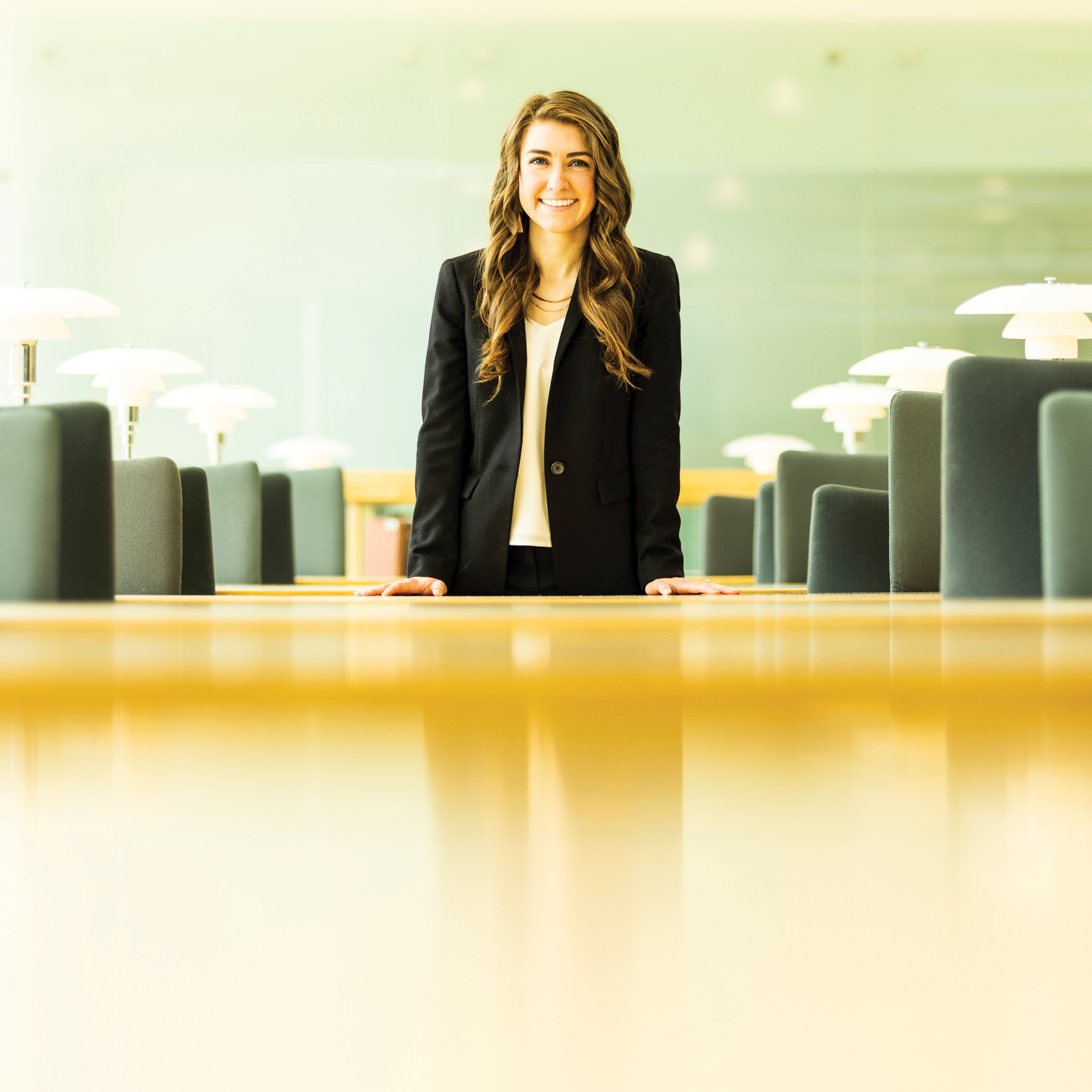From the outside in From the outside in From the outside in
Mentorship, scholarship and compassion made Teresa Dennerlein’s journey to law school possible after an isolated childhood.

Mentorship, scholarship and compassion made Teresa Dennerlein’s journey to law school possible after an isolated childhood.
On a dark winter morning in 2016, Teresa Dennerlein, ’21, dropped off her spouse at Joint Base Lewis-McChord before driving north to the UW Tacoma campus. She was excited and nervous about starting college—her first time in “a real classroom.”
Dennerlein grew up in what she describes as an ultra-religious, conservative community, disconnected from the outside world and informally homeschooled by her parents. Her education often took the form of her parents handing her a book to read. Gaps in her knowledge bubbled up at unexpected moments at the UW, like after an ancient history class when she had to look up the location of the Mediterranean Sea.
Compassion and support from her professors made her feel less alone—and changed how she saw her own abilities in and out of the classroom. “My professors saw me as a whole human, not just as someone who was smart or academically capable,” says Dennerlein, her voice cracking with emotion as she recalls how meaningful it was to hear a favorite professor say, “I could never be disappointed in you.”
Dennerlein is now about to start her second year at the UW School of Law, which she says feels like “bonus points” after finishing her UW degree: “I made it further than I was supposed to, given my upbringing.” Her journey from that first day of class to law school was enabled by encouragement from her professors and support from mentorship programs and scholarships. Together, these support systems gave her a sense of belonging—and the confidence that she could make a difference in other people’s lives.
Dennerlein is used to feeling like an outsider. She describes a childhood and adolescence cut off from society in a “cultlike” community in Virginia. That formative experience remained with her even when she found a way out, traveling the country as a violinist with a band and eventually moving to the Pacific Northwest, where her military spouse was stationed.
“Part of my identity was shaped by feeling excluded, so I don’t want anyone else to feel that way,” says Dennerlein, at the same time acknowledging her privilege in society as a white woman. “I want to go to bat for people who are excluded or discriminated against—or who don’t have access to the law.”
At the UW, the politics, philosophy and economics major appealed to her desire to better understand the rules of the society her parents had taught her to mistrust. Public service and advocacy seemed like a natural next step—a way to help others who’ve been excluded. But Dennerlein didn’t have any examples to draw from in her life, no attorneys in her family to call or personal networks to mine.
“Until we have more judges who grew up poor and understand that a $5 fine can change someone’s life, judges will perpetuate rules that don’t actually get at fairness.”
Teresa Dennerlein
The Dressel Scholars and Legal Pathways programs at UW Tacoma filled that gap. Both programs aim to break down barriers for students who are the first in their families to attend college or who come from communities historically excluded from higher education. As a Dressel Scholar, Dennerlein connected with five Tacoma-area attorneys who mentored her and provided practical insights into the legal profession. “Mentorship makes a big difference,” she says, “when you didn’t grow up with attorneys and you don’t know what the field looks like.”
The Legal Pathways program helped Dennerlein solidify her interest in law versus a related field like public policy. Funded by the Washington State Legislature to increase access to legal education and careers, the program offers a mix of speakers, workshops and mentorship. It also helped Dennerlein navigate the often-unwritten rules of the law school application process and fully understand the financial implications of going to law school.
Dennerlein believes that by diversifying the legal field, the program will change the face of law—and make it more meaningful. “People with privileged backgrounds look at the law differently,” she explains. “Until we have more judges who grew up poor and understand that a $5 fine can change someone’s life, judges will perpetuate rules that don’t actually get at fairness.”
With guidance from the Legal Pathways director and her other mentors, Dennerlein applied and was accepted to several law schools, including at Georgetown University and Seattle University. She chose UW Law when she found out she’d received the prestigious Gates Public Service Law Scholarship, a full-ride award given to just five first-year students each year.
Thanks to the scholarship, Dennerlein has been able to focus solely on her studies and not worry about finances. She notes how critical this support is: “A lot of students really want to do public-interest work but can’t, for example, take unpaid internships because they aren’t getting a stipend.”
This summer, Dennerlein will head to Pittsburgh to work for the United Steelworkers union as a Peggy Browning Fellow. It’s her opportunity to experience the kind of work she wants to do in the future as a labor lawyer: advocating for workers and addressing power imbalances between workers and their employers.
“I want to use my law degree to help as many people as I can,” Dennerlein says. “I’m empowered to do that because of the scholarships I’ve received. Generosity has changed my life.”